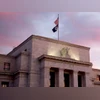Federal Reserve Governor Christopher Waller on Tuesday put a pin in speculation that interest rates may need to rise again, saying the latest inflation data is "reassuring" and the U.S. central bank's policy rate is set appropriately.
After three months of stronger-than-expected price pressures that raised concerns progress had stalled, "more recent data on the economy indicate that restrictive monetary policy is helping to cool off aggregate demand and the inflation data for April suggests that progress toward 2% has likely resumed," Waller said in remarks prepared for delivery to the Peterson Institute for
International Economics. "Central bankers should never say never, but the data suggests that inflation isn't accelerating, and I believe that further increases in the policy rate are probably unnecessary."
International Economics. "Central bankers should never say never, but the data suggests that inflation isn't accelerating, and I believe that further increases in the policy rate are probably unnecessary."
Fed policymakers have turned cautious on the outlook for inflation and monetary policy in recent months, and Waller, like many of his colleagues, did not repeat his view from recent speeches that a rate cut is likely later this year.
The labor market remains strong, he said, and while consumer price inflation slowed in April after the first three months of the year, the progress was "modest," with core inflation as measured by the personal consumption expenditures price index likely running at an annualized 3.4% in the recent three months.
Also Read
But he also said he sees some signs of moderation ahead, citing flat retail sales in April, rising delinquencies on credit cards and auto loans, and a widely followed survey of non-manufacturing businesses suggesting a deceleration in activity. Job creation also has slowed, and the unemployment rate ticked up to 3.9% in April.
"The economy now seems to be evolving closer to what the Committee expected," Waller said, referring to the central bank's policy-setting Federal Open Market Committee.
"Nevertheless, in the absence of a significant weakening in the labor market, I need to see several more months of good inflation data before I would be comfortable supporting an easing in the stance of monetary policy." The Fed has kept its benchmark policy rate in the 5.25%-5.50% range since last July.
Traders expect the central bank to deliver a first rate cut in September, and see better-than-even odds of a second cut at the Fed's final meeting of the year in December.

)
